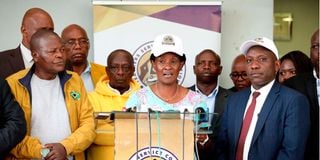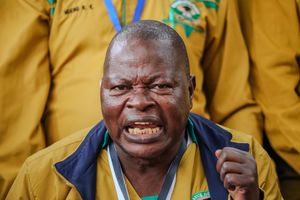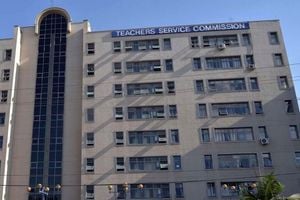
Teachers Service Commission CEO Nancy Macharia (center) with Kenya Union of Post-Primary Education Teachers Secretary-General Akelo Misori (left), TSC Chairman Dr. Jamleck Muturi (right) and other officials during a press briefing in Nairobi on September 2, 2024.
The teachers’ strike that paralysed learning in secondary schools for the past one week was called off on Monday after a day-long meeting between the Kenya Union of Post Primary Education Teachers (Kuppet) and the Teachers Service Commission (TSC).
On Monday evening, Kuppet suspended the strike and instructed all public secondary school teachers to resume their duties.
The announcement came amid claims of arm-twisting and non-fulfilment of the teachers’ demands.
But union officials said the decision was informed by the recent progress on sticky issues that initially led to the industrial action.
The announcement came as a surprise since barely 24 hours earlier, on Sunday, the decision-making organ of the union, the National Governing Council met in Nairobi and resolved to press on with the strike until the employer signed a return-to-work formula with them.

Students walk on the streets of Kakamega town on September 2, 2024 as the teachers' strike entered the second week.
Kuppet successfully negotiated for restoration of the previously reduced medical allocation, ensuring that teachers receive healthcare in public and private hospitals.
“Additionally, significant strides have been made in addressing the long-overdue promotions, with the TSC now actively working to secure funds to promote as many teachers as possible.
“In compliance with the court order and to facilitate ongoing discussions, we have decided to suspend the strike and urge all our teachers to return to class. We are committed to ensuring that the outstanding issues are resolved swiftly in collaboration with the commission,” said Kuppet Secretary-General Akelo Misori.
“Our primary concern has been the implementation of the 2021-2025 collective bargaining agreement (CBA). We have noted the challenges with the compromised medical cover, which has led to teachers being turned away from medical facilities, even those with critical conditions. Thankfully, we have managed to restore the previously reduced medical allocation,” he added.
However, the deal was not secured without opposition. Sources close to the talks said that the parties disagreed at various stages, leading to the long meeting. A press conference that the TSC called for 2.30pm did not take place until after 5.40pm.
Kuppet’s secretary for secondary education, Edward Obwocha, stormed out of the meeting insisting on a concrete return-to-work formula. He was not present at the joint press conference between the union and TSC.
The union emphasised their efforts in securing appropriate compensation for teachers who have been serving in roles of responsibility without receiving the associated allowances. They expressed optimism that ongoing discussions with the Salaries and Remuneration Commission will result in a favourable resolution of the matter.
“We want to inform our teachers and members that the portal for this process is now open, and the Teachers Service Commission is actively seeking funds to promote as many teachers as possible. We have also received assurances that teachers currently serving in positions of responsibility without receiving the appropriate acting allowances or special allowances will soon be addressed,” Mr Misori said.
“Ongoing discussions with the Salaries and Remuneration Commission are focused on ensuring that all teachers in such roles are given the consideration they deserve, with significant progress already made,” he added.
Mr Misori noted that the prolonged halt in learning created a sense of uncertainty and frustration among parents who were concerned about their children’s academic progress. Students, too, were left in a state of limbo, uncertain about when they would return to their studies and preparations for end-year examinations.
The union expressed deep empathy for the difficulties faced by both parents and students, acknowledging the emotional and educational toll of the strike.
“We acknowledge that our teachers are the backbone of this nation, and we understand the anxiety parents feel as their children are sent home due to the ongoing industrial action. On behalf of the union, we want to emphasize that we must demonstrate strong leadership,” Mr Misori said.
The strike was initially called to push for the implementation of the 2021-2025 CBA, among other issues.
TSC boss Nancy Macharia said the government had released funds for the implementation of the second phase of the CBA. TSC last month implemented the second phase, backdated to July 1.
“The Commission is pleased to confirm that the government provided funds for the implementation of the second phase of the CBA, and all our teachers have benefited. We have ensured that the second phase of the CBA has been duly paid, together with any arrears. We are committed to resolving these issues in collaboration with our teachers and unions,” Ms Macharia said.
The TSC boss also highlighted that 51,200 teachers were already promoted, with plans to promote more as budgetary allocations permit.
Kuppet had demanded promotion of 130,000 teachers, whom it says have stagnated in the same job groups for years.
“The commission shall continue promoting teachers as and when budgetary allocations are availed by Parliament. Negotiations for a new CBA will commence once Kuppet submits their memorandum of demands. Both parties have agreed that any remaining issues will be resolved through further negotiations, as is customary,” she said.
“We wish to thank Kuppet for exploring alternative dispute resolution mechanisms and for agreeing to call off the strike. We thank our teachers for the incredible job they continue to do to ensure smooth learning activities in our schools. We call upon all our teachers to resume classes as we continue serving this nation. The interest of the child and the nation comes first,” she added.
Mr Obwocha, however, disagreed with his union colleagues and walked out, expressing his frustration with the calling off of the strike.
“Yesterday [Sunday] the NGC met and said that if there’s a return-to-work formula, the document can be sent online for approval. They were in a hurry to sign without anything tangible but just promises and that’s why I stormed out,” he said.
A statement by TSC said that funds have been allocated for “retooling” junior school teachers as opposed to their conversion to permanent terms. The teachers have been agitating for their employment on permanent terms.
“While they were able to settle the review of career progression guidelines, remittance of third-party deductions, promotion of teachers, medical scheme, and commencement of the new round of CBA implementation, they fell below expectation on the confirmation of 46,000 JS intern teachers which to them is a non-issue,” said John Melvin, one of the JS teachers.











